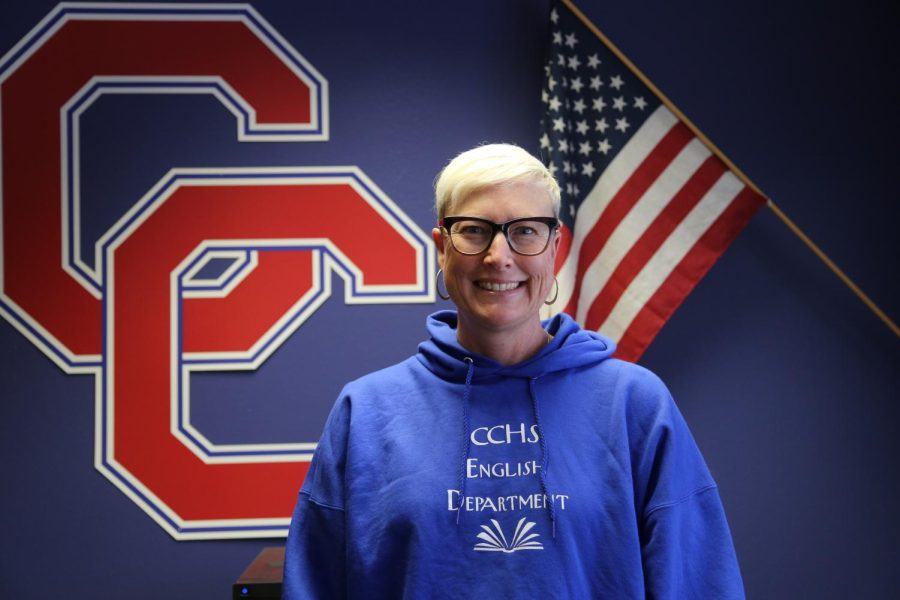English Department Coordinator Kim Gilbert Makes Major Changes
Gilbert’s actions focused on modernizing traditional practices
Gilbert is pleased with the department’s response. “I love that the department has been really willing to consider changes and to work with me so that we can strengthen what we offer to students and hopefully meet their needs more so than we have in the past,” Gilbert said.
February 25, 2022
Renovation is a hard job, but when your pipes are rusting and the windows aren’t up to code, it’s necessary. This was the job for Kim Gilbert when she was voted in as English Department Coordinator by her peers through a formal election process three years ago.
As her first term as coordinator comes to an end, Gilbert is looking to enter her second term on a high note after a series of reforms to the department. Traditionally accepted practices like summer reading, standardized grammar curricula, senior electives, and required books across grade levels have been either completely removed or undergone dramatic changes.
Gilbert, who’s been teaching at Creek for almost 15 years, said the traditions at Creek were widely accepted because of teachers’ comfort with the system.
“A lot have teachers in the department had been here for a long time, and so many people in the department liked their ability to do what they needed to do,” Gilbert said. “They didn’t really want to make many changes, and they were very comfortable in the department. For me coming in as a new teacher, it was really nice because everybody seemed to know how this place worked, and I just needed to figure out how to fit into that and then I then I was fine.”
But after she acclimated to her career at Creek, she decided that some things need to change as the demographics of Creek changed.
“We had to evolve, and that’s just even with what we are dealing with now with the pandemic. The needs of mental health, more diverse texts, differentiating the way that we’re teaching and the way we’re grading,” Gilbert said, “if you don’t evolve, then you’re going to be like a dinosaur and end up dying out.”
Other English teachers look to Gilbert as a facilitator of change in a department that has historically strong qualities, but is also old-fashioned.
“I think the way that she conducts herself is so fascinating for kids and for teachers because she’s open to hearing people and hearing different voices, and she really listens to people,” English teacher Lesley Philipps said. “She’s amenable to change, and this is a very traditional school, so I think the fact that she is so willing to enable and help make some appropriate changes is a pretty admirable task.”
Philipps also mentioned that having a female coordinator was an interesting change for her both professionally and personally, and that she enjoys Gilbert’s sense of humor and personality, but also her humanity and capacity to treat members of the department like her family.
“She’s witty and funny and she has a great dry sense of humor. I think that she is very, very in tune with what our department needs as professionals, and then also as people,” Philipps said. “We’ve just had some hard things happen in our department over the past month for people personally – with illness and losing parents and things along those lines – and she’s very much a provider, a giver, and a nurturer in that way. She is collecting money for people and having cards signed for individuals from our department.”
In the biggest department on campus, with around 38 teachers, Gilbert manages tasks like master schedules and teaching her own classes, but also the bigger and more long term changes that she wanted to make.
“I don’t want to take credit for all of those things, because what happened was when I stepped in, I said, ‘I’d be open to the possibility of changing whatever we need to change,’” Gilbert said. “My method has been to get as much input and feedback from the department as possible, so I don’t feel like I’m driving this change, I’m just throwing out ideas and possibilities and seeing what the department members really want to do.”
One of the first steps was getting rid of summer reading, which many students were not fans of. Part of the ideology behind that move was the desire from teacher’s perspectives to foster a love for reading for their students, and the fact that they didn’t feel summer reading was necessarily accomplishing that.
“We want kids to have a love of reading, but is assigning summer reading allowing students to then love reading?” Philipps said. “I think that’s why we strayed from that a little bit.”
Another project the department took on was changing the guidelines around required books across grade levels, such as every freshman reading To Kill a Mocking Bird, or every sophomore reading Catcher in the Rye. Teachers looked to make the books they were teaching more representative of the student body.
“What we want in this big world is for our students to be exposed to ideas or perspectives that are different from their own, and from eras and time periods are different from their own,” English teacher Joel Morris said. “We want books that they see themselves in that maybe they haven’t seen themselves in or represented in before. Seeing yourself in a novel or a story or a movie can be such a powerful and empowering thing.”
Rules around the grammar test were also altered, with COVID acting as a catalyst for taking a test that was a huge part of the department and making it much less important.
“It began last year born out of necessity because it was just unwieldy to teach that grammar unit online,” Eichorn said. “I think it’s hard to justify the time it would take given that teachers just couldn’t get as much done last year.”
Gilbert said in addition to more immediate needs, there were also some philosophical questions around holding a test that was such a huge percentage of a student’s final grade – usually fifteen percent.
“The question became, what skills are necessarily the most important in that workbook? Is this preparation for an ACT exam? Is it a writing skill? Does it improve writing? So all of those types of conversations started to happen,” Gilbert said.
One of Gilberts most recent changes was opening senior electives to the junior class, with the stipulation that if they took a semester elective, they had to take an intro to college composition course the next semester. Previously, incoming juniors had the choice between CP 11 and AP English Language and Composition.
“I think it’ll be pretty cool for students to have some some more choice than what they have traditionally been offered,” Philipps said. “It’ll be a really interesting change for them to have that more college like experience where they are allowed the freedom to not be pigeonholed in one of two classes.”
Gilbert said that overall, she is pleased with the response from the department and how receptive teachers have been to her plans.
“I love that the department has been really willing to consider changes and to work with me so that we can strengthen what we offer to students and hopefully meet their needs more so than we have in the past, especially with the changing environment in the society in Creek,” Gilbert said.
Just like renovating a house, renovating the English department was a family affair, and according to Philipps the sense of family is one of the best things to come out of Gilbert’s time as Coordinator.
“The people in our department, we’ve all been together for a long time, and maybe I’m just like such a nerd, but I think of them as my family,” Philipps said. “The collaborative piece that we have now is huge. You feel happiness in the workplace, and there’s that feeling of, we’re a family, and we’re a team. That feels really incredible, and I feel like she’s planted the seed for that.”






















